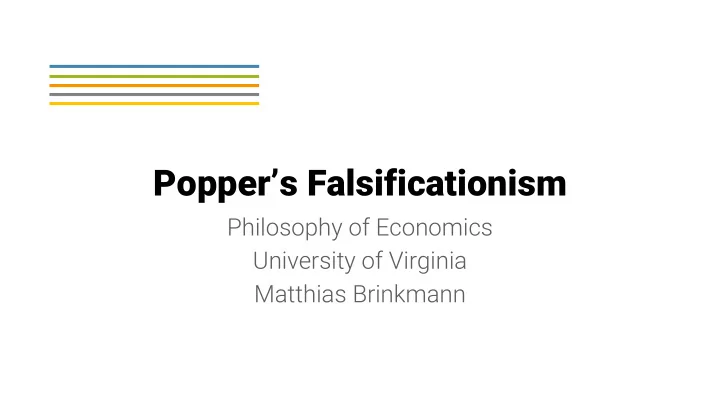

Popper’s Falsificationism Philosophy of Economics University of Virginia Matthias Brinkmann
Contents 1. The Problem of Induction 2. Falsification as Demarcation 3. Falsification and Economics Popper's Falsificationism 2
The Problem of Induction Is the next swan white? Are all swans white? • Can there be a principle of induction / “inductive logic” : “if we observe n white swans, then we know that all swans are white”? • How would we argue for this principle? Non-empirically (without observation). But the principle of induction is not true as a matter of logic. Empirically (through observation). You might argue: the principle of induction can be observed to be true. Whenever we apply the principle, it works. But how do you know that this inductive inference is reliable? Popper's Falsificationism 3
Troubles for Verification • Consider the following claim: Verificationism. A claim is meaningful only if it can be empirically verified. • If verificationism was true, then “all swans are white” would be meaningless • Here’s a deeper problem Science aims to discover laws (law of gravity etc.) Laws are universal in nature (the law holds for all times and places etc.) If verificationism was true, core elements of science would be meaningless! Popper's Falsificationism 4
Falsification vs Verification 1. If general hypothesis, then 1. If general hypothesis, then particular observation particular observation 2. Particular Observation 2. Not particular observation 3. Therefore, general 3. Therefore, not general hypothesis hypothesis • This is a mistake in logic! (Why?) 5 Popper's Falsificationism
Popper on the Problem of Induction • Popper thinks that the problem of induction is insurmountable No empirical theory can be verified No empirical theory can be shown to be true, proven, or even probable(!) • But: there is an asymmetry between falsification and verification Falsification is possible Popper's Falsificationism 6
Contents 1. The Problem of Induction 2. Falsification as Demarcation 3. Falsification and Economics Popper's Falsificationism 7
Two Contexts Context of Discovery • How a theory is created/discovered/stated • Might be based on irrationality, wild guesses, (“psychology of intuitions, inductive observation, etc. knowledge”) • Popper thinks that attempts at “rational reconstruction” (p. 8) on this level will fail Context of Justification • Whether a theory is justified/validated/ empirically supported (“logic of knowledge”) • The main problem Popper is interested in* • Only falsification is relevant here *The title of Popper’s book is standardly translated as “The Logic of Scientific Discovery”. But the German title is simply “ Logik der Forschung ”, i.e., “The Logic of Science”. 8 Popper's Falsificationism
Elements of Popper’s View • Demarcation. Some theory is scientific just in case it can be falsified • Procedural Ideal. Science should focus on severe testing of risky predictions Popper's Falsificationism 9
Demarcation between Theories PSEUDO-SCIENCE FAILED SCIENCE SCIENCE (OR NON-SCIENCE) Scientific theories which are Scientific theories which are Scientific theories which are not even in principle in principle falsifiable , in principle falsifiable , falsifiable which have been exposed to which have been exposed to severe testing , severe testing, and have been falsified . and have not been falsified . (“ Corroborated ” theories) Freud’s theory, Adler’s theory, (early) Marxist theory of Einstein’s theory (late) Marxist theory of history history, Astrology Popper's Falsificationism 10
Popperian Methodology How would someone who accepts Popper’s views conduct science? 1) Consider only falsifiable theories Even Better: Choose theories which are prohibitive , and are incompatible with many potential observations 2) Do not count confirmations if they are not based on prior predictions 3) Always test a theory as severely as possible New Evidence: make predictions for cases you do not already know Risky Predictions: focus on unlikely, implausible predictions 4) Avoid “conventionalist stratagems”: fixing your theory through introducing ad hoc assumptions Popper's Falsificationism 11
Contents 1. The Problem of Induction 2. Falsification as Demarcation 3. Falsification and Economics Popper's Falsificationism 12
Questions • Does Hotelling’s model follow falsificationist strictures? Does it make falsifiable predictions? Does it follow Popperian methodology? • Does economics more generally follow falsificationist strictures? Think of particular subareas of economics • Does science (outside economics) generally follow falsifications strictures? Popper's Falsificationism 13
Some Problems • Models are “born wrong”: we know from the beginning that their assumptions are wrong • Little to not testing E.g., Hotelling: only seems to look for confirmations, no experiment • Ceteris paribus clauses (Hotelling’s Law) Can statements with open-ended ceteris paribus clauses be falsified? What does Hotelling’s model exclude? • Predictions are only ever roughly true “Inflation will normally rise when the money supply increases”— but that seems to exclude little • Stochastic predictions (“inflation has an 80% probability to rise”) Stochastic predictions cannot be falsified! Popper's Falsificationism 14
A Harsh Criticism Despite the fact that preaching falsificationist methodology has been very popular among economists, the method fails to provide a reasonably adequate set of rules for doing economics. Strict adherence to falsificationist norms would virtually destroy all existing economic theory and leave economists with a rule book for a game unlike anything the profession has played in the past. (Wade Hands, “Popper and Lakatos in Economic Methodology”) Popper's Falsificationism 15
Options Where do we go from here? • Option (1). Reject falsificationism . Something can be good scientific practice without being focussed (as much as Popper wants) on falsification and severe testing • Option (2). Reject falsificationism for economics . Popper’s model is only plausible for the natural sciences; economics is different: it’s a social science. • Option (3). Reform economics . Accept falsificationism, and claim that economics should be relevantly reformed. (Perhaps some areas of economics already live up to the idea of severe testing.) Popper's Falsificationism 16
Recommend
More recommend